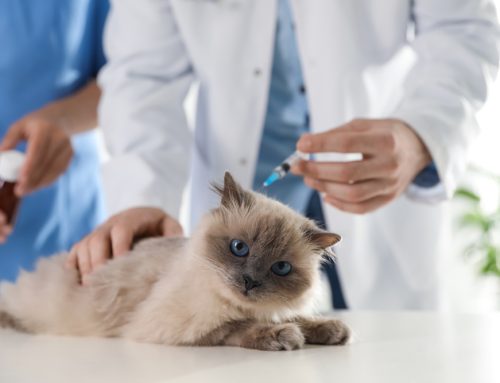Your cat is an important part of your life, and we know you want her to have every opportunity for a long, healthy life. Are you wondering what steps you should take to ensure her good health? From kittenhood to advanced age, we can help you map out a plan of appropriate vaccinations, preventive medicine, and routine wellness evaluations to keep your feline family member healthy and happy.
Viral testing in cats
Every cat new to your family should be tested for infectious, life-threatening viral diseases that can infect other cats, cause chronic illness, and shorten her life. A quick blood test will confirm your cat does not have feline leukemia or feline immunodeficiency virus. Once we know your cat is disease-free, we can recommend a course of vaccinations to keep her healthy.
Vaccinations for felines
Every cat should receive routine vaccines, and we can help you determine those necessary for your cat’s lifestyle. Vaccines recommended for your cat may include:
- Rabies — Rabies is a deadly disease that is transmitted through a bite wound from another animal. Rabies can also be passed to people. Rabies is considered a core vaccine, and is recommended (and required by Florida law) for every cat who is healthy enough to be vaccinated.
- Feline viral rhinotracheitis — This chronic respiratory infection is caused by a herpesvirus that some cats harbor throughout their life, with intermittent illness and possible transmission to other cats. Feline viral rhinotracheitis is also a core vaccine.
- Calicivirus — Feline calicivirus can cause severe respiratory infection characterized by painful oral and nasal ulceration, and possible arthritis. The calicivirus vaccine is recommended for all cats.
- Panleukopenia — Although it is sometimes called feline distemper, panleukopenia is caused by a feline parvovirus, and is completely different to the distemper that plagues dogs. This highly contagious disease causes severe gastrointestinal disease, white blood cell deficiencies, and neurologic deficits in infected kittens. Panleukopenia is also a core vaccine, and is typically combined into one injection with feline viral rhinotracheitis and calicivirus.
- Chlamydia — The bacteria Chlamydia psittaci causes a respiratory infection characterized by conjunctivitis and severe eye inflammation. Protection against Chlamydia can often be added to an injection that also includes feline viral rhinotracheitis, calicivirus, and panleukopenia.
- Feline leukemia — Feline leukemia is caused by a virus that is transmitted through direct contact with an infected cat, and can cause life-long immunosuppression, recurrent illness, and cancer in infected cats. The feline leukemia vaccine is recommended for all cats who go outdoors or who will potentially contact other cats.
Parasite prevention for cats
Many internal and external parasites can threaten your cat’s health by causing infection and transmitting diseases. Parasites of concern include:
- Fleas — In addition to causing an annoying itch, fleas can transmit diseases and cause life-threatening anemia.
- Ticks — As a tick drinks a pet’s blood, it can transmit dangerous diseases, such as Lyme disease, tularemia, and tick paralysis.
- Heartworms — Dogs are the desired host for heartworms, but if an infected mosquito bites a cat, the few worms that are transmitted can cause chronic respiratory inflammation, asthma-like symptoms, and even sudden death.
- Intestinal parasites — Gastrointestinal parasites, such as roundworms, coccidia, and Giardia, can cause potentially severe diarrhea, vomiting, and dehydration in infected cats.
Kittens should be dewormed to eliminate any worms they are born with, and should then receive a monthly preventive to destroy worms they pick up from the environment. A regular preventive can also be used to protect your cat against fleas, ticks, and heartworms. Our veterinary team can determine your cat’s risk for these parasites, and recommend appropriate products to keep her parasite-free.
Routine wellness checks for cats
Despite receiving the best preventive care, some cats will still develop diseases and illnesses. Regular wellness checks are critical to evaluate your cat’s overall health and screen for disease signs that may not be apparent. Adult wellness checks should be performed annually until your cat is 5 years of age, and senior wellness checks yearly thereafter help identify and address health concerns as she gets older. Wellness visits will include a thorough physical exam and fecal analysis to screen for intestinal parasites.
Regular blood work helps evaluate organ function and screen for diseases in their early stages. Cats are masters at hiding illness and often don’t display clinical signs until a disease has advanced. As cats age, their risk for organ degeneration increases, with the kidneys particularly susceptible to disease. Cats seldom show signs of early kidney disease, which will advance quietly until most kidney function has been lost. By the time clinical signs are evident, few, if any, treatment options may be available. Blood work allows us to analyze kidney function, along with other organ systems, to know if your cat is hiding an illness. If detected early, many diseases can be treated so they progress slowly, your cat’s quality of life is improved, and you have more precious time with your pet.
Check out this video, where Dr. Man introduces Stan, a nearly 20-year-old cat whose routine blood work two years ago revealed changes in his kidney function, despite no other clinical signs of kidney disease. Thanks to early diagnosis and intervention, Stan is doing great as his owners work with Dr. Man to manage and control his kidney disease.
Here’s what Stan’s owners have to say about their experiences with Boca Midtowne Animal Hospital:
Have questions about keeping your cat healthy and happy? Call us.








Leave A Comment